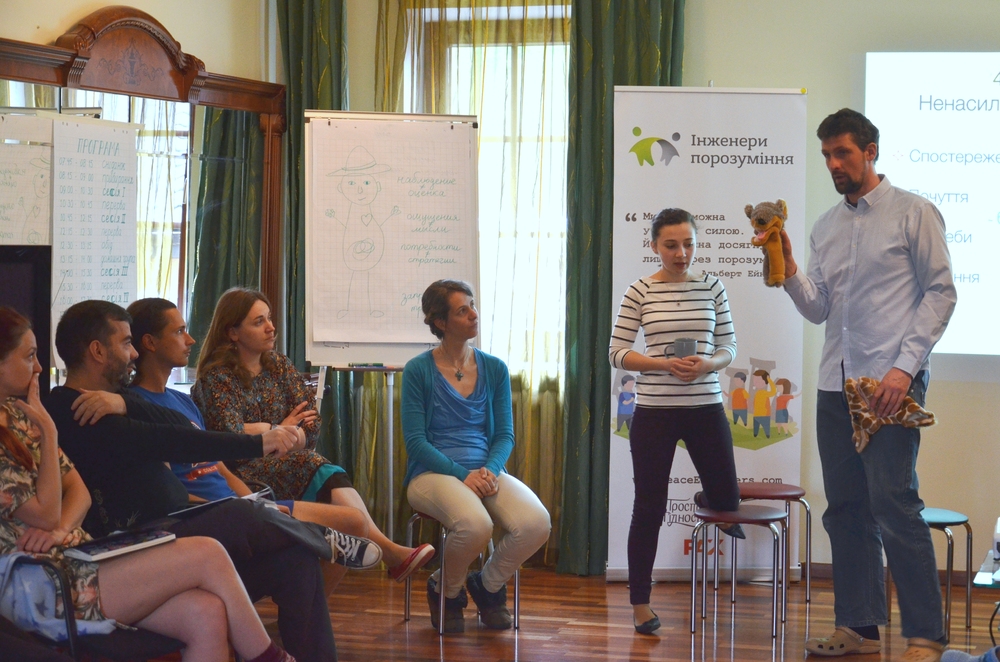The objectives were to train professional dialogue facilitators, stimulate the facilitation of dialogue amongst and between antagonist groups and to support concrete problem-solving measures in the communities that engage in dialogue. These communities were for instance volunteers vs. local authorities, local population vs. internally displaced people (IDPs) or pro-Maydan vs. anti-Maydan. Additionally, by engaging with professionals in crucial positions, we aimed to raise awareness for the need of a culture of dialogue and stimulate creating related jobs.
The project started in January 2017 and takes place in Kyiv (the training part) and in Eastern Ukraine (the practice part). It lasted two years and ended in late 2018. We worked together with our local partner, the Ukrainian Centre for Nonviolent Communication (NVC) and Reconciliation “Dignity Space”.
Situation & Urgency
Ukraine as a country is characterised by diversity, growing civil society and conflict. Within that context, historic and contemporary traumas, stereotypes and conflicts have yet to be dealt with and linger on. As a consequence, the past years have seen increasing polarisation with increasingly little room left to stay ‘neutral’. We see a profound mistrust within and between communities as well as towards the authorities. This seriously hampers democratic reforms, the fight against corruption and not least, initiating peaceful approaches towards ending the war in Eastern Ukraine.
However, within the turmoil of recent conflicts, civil society has strongly developed into an almost professional parallel system: government and civil society organisations (CSOs) are guiding the country side by side. But, many of those CSOs who wish to help further do not possess the habit nor the skills of non-violent dialogue. The need for a culture, skills and structures of dialogue and reconciliation thus requires a serious and long-term investment, and is key on the road to durable transformation of society and political systems.
Contact
Cinta Depondt, Programme Manager Eastern Europe & Eurasia, depondt@paxforpeace.nl
Activiteiten & resultaten
Training process
The training process consisted of three interdependent steps, each lasting four months. We trained about 45 Ukrainian facilitators/mediators (‘trainees’) in three different groups, one group starting four months after the other.
The first phase of the training process consisted of theory. After that, the trainees put their theory-training into practice by facilitating dialogue between groups, preferably somewhere in their home region. In the third and final phase, the trainees facilitated dialogues at a senior level. At the same time, they were supervising the trainees who were in the preceding phase. Each trainee thus ‘studies’ for 12 months. Trainers are both Ukrainian and international.
Monitoring, evaluation, supervision/intervision
During the practice period (month 5-12 for each group of ‘trainees’), the trainees in phase two were supervised by mentors. The role of mentoring was a serious one, since during phase two each trainee aimed to facilitate a dialogue in the region where they are from or where they live. This required intensive guidance and support. Trainees worked in pairs to stimulate a positive learning environment and trust. Every few weeks trainees that were in their practice phase returned to the project house in Kyiv to exchange ideas and get to know trainees from other groups. This aimed to create a strong network of NVC-facilitators.
The website Peace Engineers (in Ukrainian) was created for the purpose of promoting the project and its ideas in general. It was also used to recruit new trainees.
Quality facilitation and follow-up of dialogue sessions
Upon completion of the training, the facilitators returned to their places of residence, where they reached out to previously identified groups experiencing tensions with one another and proposed to facilitate between them.
Professional track: A group of approximately 30 professionals were given the opportunity to learn more about NVC and were invited to critically examine how and where it could be sustainably integrated into their work.




